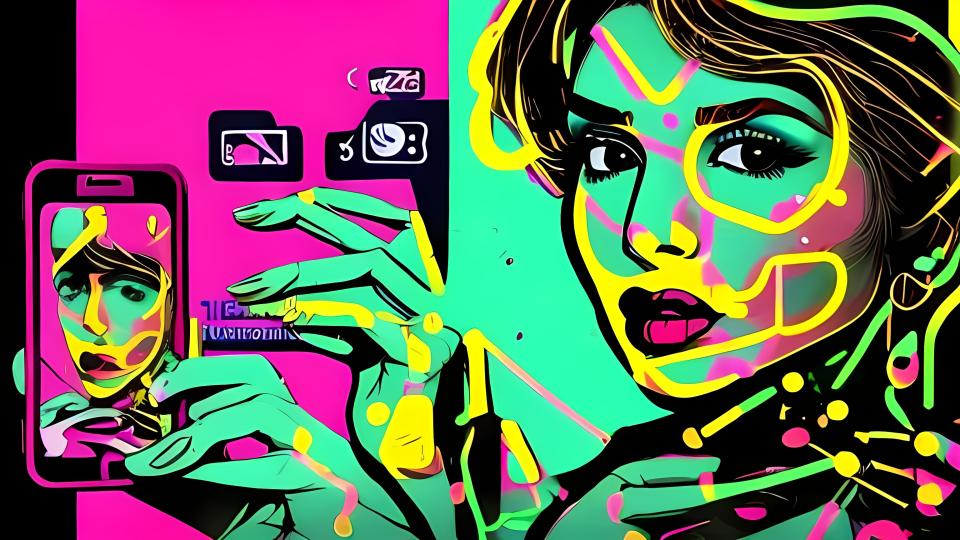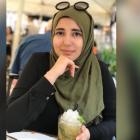
AI generated illustration.
When 30-year-old Mahnoor Lodhi, who lives in Karachi and is a content creator by profession, was in university, a stalker copied her photos from her personal social media profiles and posted them publicly with her phone number and captions like ‘professional whore’. She says, “Things spiralled out of control. I would get calls, I would get harassed a lot. It made me go offline for a while.”
Mahnoor wanted to create her blog for a while at the time, but this incident rattled her and kept her away from the idea for a few years. She only got the courage to make her blog, The Desi Cinderella, in 2021, and even then the experience continues to shape how she portrays herself online.
She adds, “It reinforced this idea in my head of inbuilt perception in Pakistan, that women here shouldn’t have public profiles because of online gender based violence (oGBV). There’s so much I could have shared in my twenties. I went abroad for my masters, travelled alone, and I wanted to share that process, help others through my experiences.” But the stalking and doxxing took that chance from her.
Having finally taken the leap to start a public blog to share her experiences of adulting, working and just navigating life, Mahnoor is now part of a growing group of women content creators in Pakistan who have become celebrities in their own right.
From multi-media artists, to comedians, travellers, journalists and activists – having a public profile has become a requirement of every job description now. Despite the influencer economy booming in Pakistan, women still face a certain amount of judgement regardless of what they choose to share. Amongst other reasons, it’s why multi-media artist Bihamaal, more commonly known by her Instagram handle Baemisaal, was sceptical of being called an influencer. The main reason was of course that her page is just one part of what she does in her daily life.
“When I started out in 2017, there weren't a lot of people who were influencers and people would call me an influencer, and I would say I'm not one, because I'm a writer and I make jewellery so please don't call me that. But with time, I realised maybe that was my own thinking. It's not a bad word and there’s also nothing wrong with that either,” she says adding, “I can't speak for all of them, but influencers have to mask their identities for many reasons that they feel like they have to. I did it [too] at one point.” Bihamaal did it out of a need to protect her own mental health from hate that she was getting because of being very vocal online.
Navigating culture while breaking traditions, speaking out when no one could imagine even mentioning taboo topics, and reclaiming their ‘desi-ness’ while breaking free from the patriarchal society that silenced them, Pakistani women have challenged the norms around what it means to be talked about or talked over.
Like Bihamaal, Sabah Bano Malik, a journalist, radio jockey and a content creator, gained a place in the field through her relatable everyday content. She also initially hesitated to make a public profile when she was working at a fashion magazine out of fear of being labelled a ‘fashion girlie,’ which she worried would be detrimental to the way friends and family perceived her. Eventually she took the leap in 2018 and set up her public Instagram profile to share the content she put out as a journalist and in other areas, but even now she has to balance a thin line between feeling responsible for creating certain content and considering her own safety.
Much like the streets, online spaces were also dominated by men for far too long in Pakistan. It wasn’t until a few years ago that Pakistani women started to claim a space for themselves in the digital world. Navigating culture while breaking traditions, speaking out when no one could imagine even mentioning taboo topics, and reclaiming their ‘desi-ness’ while breaking free from the patriarchal society that silenced them, Pakistani women have challenged the norms around what it means to be talked about or talked over. Online closed communities like Soul Sisters Pakistan by Kanwal Ahmed on Facebook, or Ahmed’s own digital talk show, Conversations with Kanwal, which addresses societal evils and taboos, have grown consistently because women have found a space to share their voices.
But for Mahnoor Lodhi, the approach may be slightly different to what we expect around social justice conversations as well as community building. Initially she started her blog to share experiences around adulting and marriage along with her travelling and food experiences. But while those have helped in getting an audience, she’s mindful of the influence she has over people and always aims to be transparent with her followers as much as she can in order to normalise both the good and bad sides of adulting.
“I want to post more stuff women go through. The other day I randomly posted a screenshot of my mother and I having a conversation about my thyroid medication and so many people messaged me, so I'll be making a video on that soon,” she says.
For anyone familiar with Pakistan’s online landscape, it’s no surprise that self-censorship is expected from women in the public sphere in Pakistan, because not doing so leads to severe consequences. One example of this is Qandeel Baloch’s murder by her brother in June 2016 in the name of ‘honour’ because she didn’t self-censor in her online content. So it becomes natural for women to silence themselves in order to remain safe. Bihamaal points out that while her own page continues to evolve with her, she’s also had to step back on being vocal about certain things, as she felt constant judgement from online users on what they thought she should be doing, and it was taking a toll on her mental health. “I went from being very vocal to having to step back, because I’d be very vocal about the things that mattered to me, but then I’d get dragged online for not talking about something else,” she shares, adding, “For women, we can’t do anything right, even when we’re doing something right we’re doing something wrong.”
Much of this self-censorship comes from the pressure Bihamaal mentions, which impacts women disproportionately more than men. While men are allowed to choose their niche and sticking to it makes them “committed”, women are expected to address everything. If they want to focus on clothes and makeup, they’re accused of being shallow and mindless and having nothing else to say. If it’s anything that leans more towards social justice or their own politics, suddenly they become the flag bearers for causing ruin in society. As a comedian, it’s what made comedian Faiza Saleem, the founder of South Asia’s first and only all-women comedy troupe, The Khawatoons, so sceptical of sharing content online despite the fact that it’s a big part of promoting her own work. While Saleem likes to keep things funny, she’s also aware of her platform and wants to raise awareness on social issues as well.
You think you’ll take care of everything that you can possibly take care of on the internet and you come back two hours later and it's gone viral, and you see you’re spammed with comments about your boobs, and it's so terrible because you didn't want attention on that and you have to turn off comments.
“I’ve always thought about my impact on other people and the world around me. I'm not in a place to change the world, but even when I was studying law, I wanted to focus on helping someone other than me. I want people to learn to be kinder in my videos, to learn not to body shame or pull people down because we do that a lot in our culture,” Saleem shares. However, she also adds, “I don’t want to get preachy, because I may have to do something different or act differently someday. And there’s people who put you on a pedestal even when you don’t ask them to, and one day they’ll decide you’ve fallen off that."
Sabah Bano Malik quite recently had to delete a number of tweets after being attacked relentlessly by a certain fanbase. She didn’t feel comfortable sharing details of the encounter and kept our conversation around it vague, but shares, “These days in Pakistan, the way people react to tweets is terrifying. I even owned up to it and said I don't care if people think I’m a coward. I’m on radio as well and there’s a lot of stuff I used to talk about, and now I’ve stopped and it’s increased over the last year.”
Malik has received her fair share of hate online. Her campaigns around body neutrality and creating visibility for bigger bodies in media are just one example of the ways her work seemingly offends certain corners of the internet, but it goes far beyond that. “I can handle a weirdo on the internet calling me a fat ugly bitch but I don't want to poke a beehive that can't be un-poked,” she says carefully.
As a woman in comedy, Saleem also has to face pressures men in the business don’t even have to think about. She’s very careful to avoid any sort of -isms in her content, and try to keep away from explicit language and content online, but at the same time she wants to stay true to herself. “I have no other personality to bring to the internet, everything is me,” she says.
But being herself comes with other people’s opinions about her, and even after 7 years of running the Khawatoons, there are times where it can get horribly vile. “You think you’ll take care of everything that you can possibly take care of on the internet and you come back two hours later and it's gone viral, and you see you’re spammed with comments about your boobs, and it's so terrible because you didn't want attention on that and you have to turn off comments,” she shares, talking about how exhausting the constant scrutiny can be.
I hope that maybe by me existing, 10-20 years later there are many more me’s in different ways.
But regardless of the struggles, and often very scary safety concerns these women have to face, they are not backing down. In all their fields, they are committed to showing other women what Pakistani women can look like without the silencing and control. For Sabah Bano Malik, it is a responsibility that comes with her privilege. “I think in some ways privilege is operating here. I know there’s certain topics I can touch upon that others can’t and in a way that makes me feel like I have a responsibility to talk about them,” she says.
Through their love for fashion, culture and being confident in their own skin, Pakistani women are telling women across the country that it’s okay to love who you are, in being a woman, and being Pakistani while still being able to challenge the parts that hurt you.
As Bihamaal concludes, “I hope that maybe by me existing, 10-20 years later there are many more me’s in different ways. When I was a kid no one like me existed but there were other women doing their part and now I want to do mine."
- 153 views







Add new comment